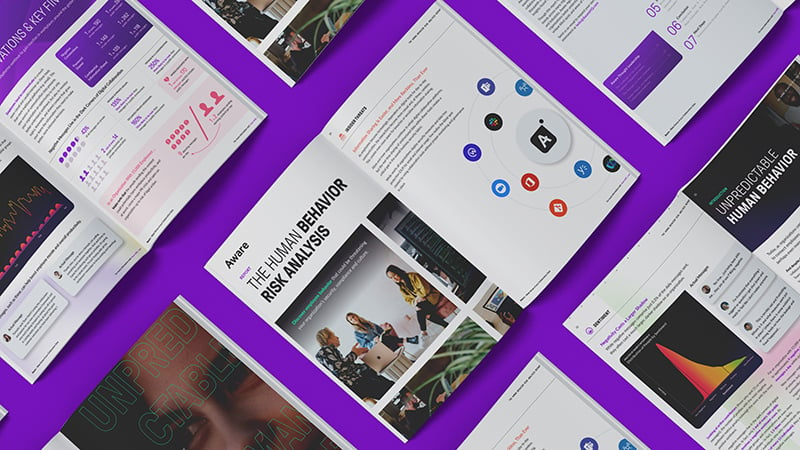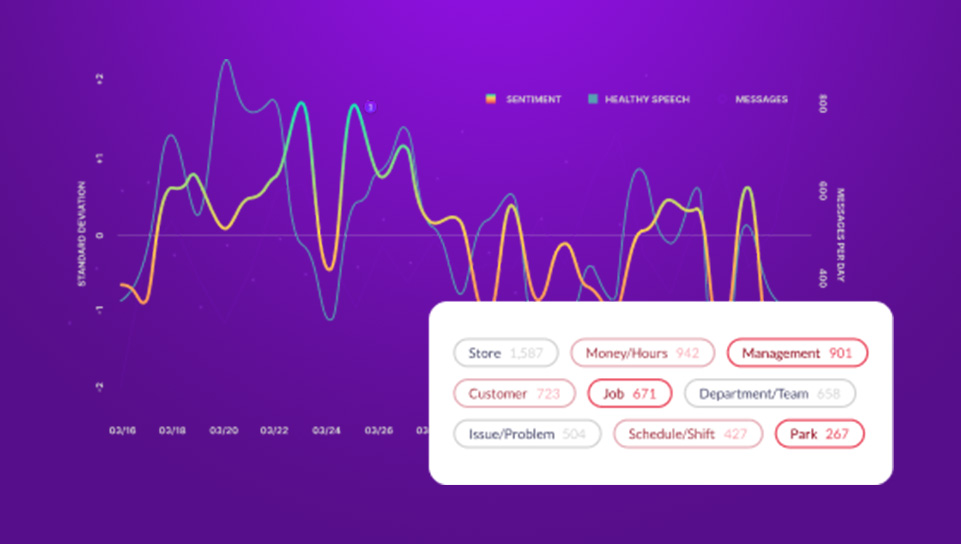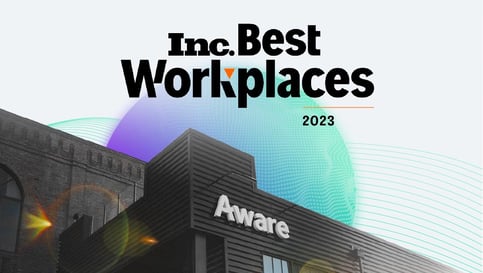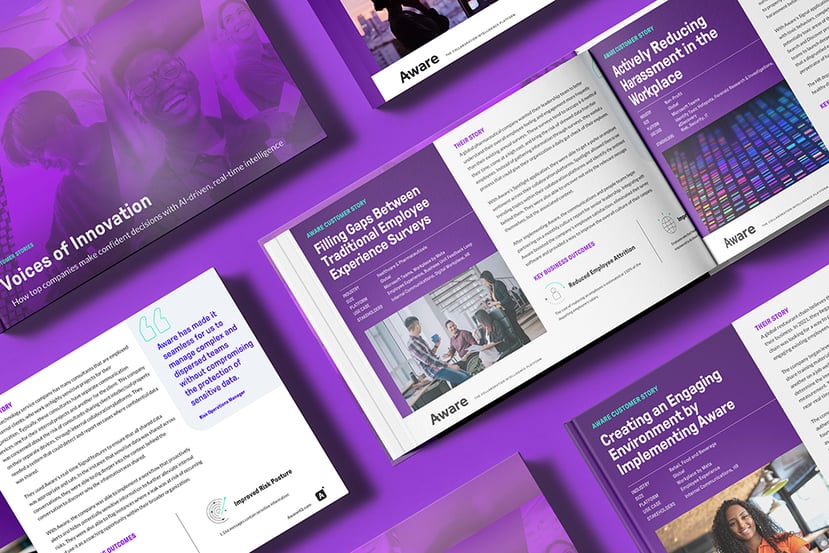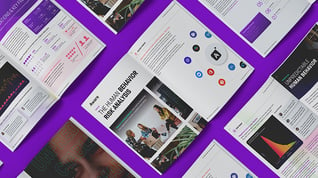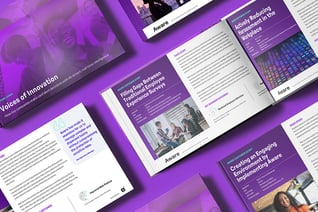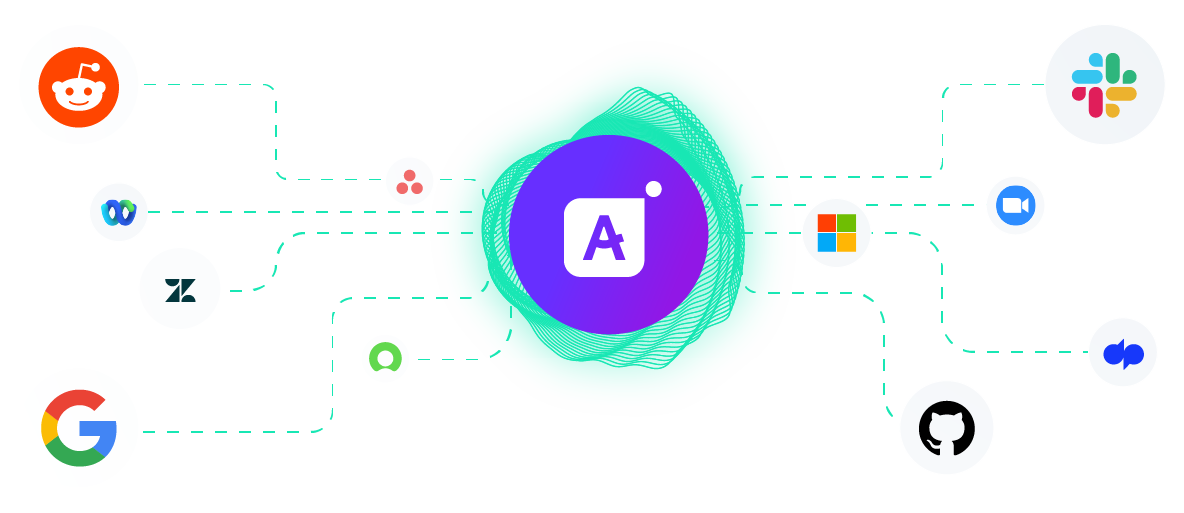The Retail Workplace Trends Report: What Frontline Workers Care About
by Aware
The Aware AI platform for employee listening uses state-of-the-art AI and natural language processing (NLP) models to provide business leaders with real-time, actionable insights into the topics that matter most to their people. Using Aware’s recently launched Context API, which delivers the same authentic insights from any collaboration source, Aware’s data scientists analyzed social media conversations to reveal the surprising cause of worker turnover. Here’s what they uncovered.
Table of Contents
- About this study
- Reddit message volume and trends
- Message sentiment and toxicity
- The topics that impact sentiment the most
- The long shadow cast by Karens
- How leaders can solve problems for the front line
- About Aware’s AI and NLP
- Why Reddit
About this study
Aware brings context to workplace conversations that helps companies achieve business outcomes and deliver a better employee experience. By intelligently analyzing workplace collaboration conversations in messaging tools like Slack, Teams, and Zoom, Aware can extract the hidden insights contained within employee voices at scale.
With the launch of Aware’s Context API, those same advanced insights are now available for any collaboration dataset, from bespoke workstream tools to third-party forums such as Reddit or Fishbowl.
Over the first four months of 2023, Aware data scientists used state-of-the-art AI and natural language processing (NLP) models to analyze 152,716 messages from the subreddits of eight major retail and frontline employers. In addition, over fifty other reports were created to build benchmarks for the results.
Selecting data from a single site and focusing on similar companies enabled us to control for cultural differences and geopolitical events. All the messages were enriched and normalized by Aware’s AI data platform before extracting the top trends and themes.
Reddit message volume and trends
Sundays saw the highest frequency of messages, accounting for over 26% of messages sent across all subreddits. The single most popular day was Easter Sunday, April 9. This makes sense given fewer frontline employees work on Sundays, and thus have more opportunity to spend time on social media.
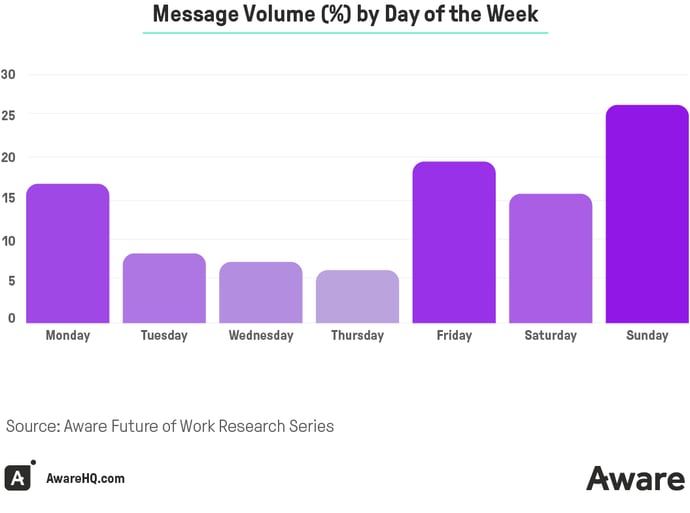
Collectively, the subreddits exchanged an average of 408 messages per day. However, the popularity of the forums varied significantly, with the most active averaging 1553 messages per day, and the least active just 55.
Message sentiment and toxicity
Aware’s natural language processing AI scores all messages on two scales: positivity and health.
Positive and negative messages
The positivity scale is a simple assessment of whether a message is positive or negative in nature. The scale was built by behavioral intelligence analysts using hand-labeled models that ensure humanlike accuracy and are continually refreshed to remain current with fluctuations in topical events, sentiment shifts, and popular slang.
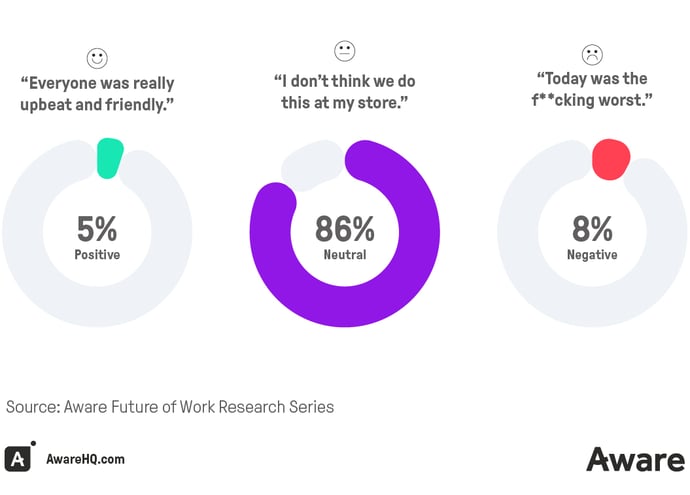
Unsurprisingly, the vast majority (86%) of messages were neutral. Of the rest, 5% were positive and 8% negative. That makes negativity 60% more prevalent than positivity among employee conversations.
Negativity, by itself, isn’t inherently bad. Studies show that we have a negativity bias that is hard to overcome—we’re more likely to remember the one person who complained about us than a thousand who were pleasant, for example. It isn’t surprising that, when discussing workplace interactions, we focus on the things that annoy us. That’s what makes workplace collaboration insights so meaningful for leaders looking to make transformative change that improves the lives of those on the front lines.
Healthy and toxic messages
Far more indicative of company culture is the prevalence of toxicity within employee conversations. Messages can—and should—be healthy, even when they’re negative. There’s a difference between sharing a complaint with a coworker and creating a toxic working atmosphere.
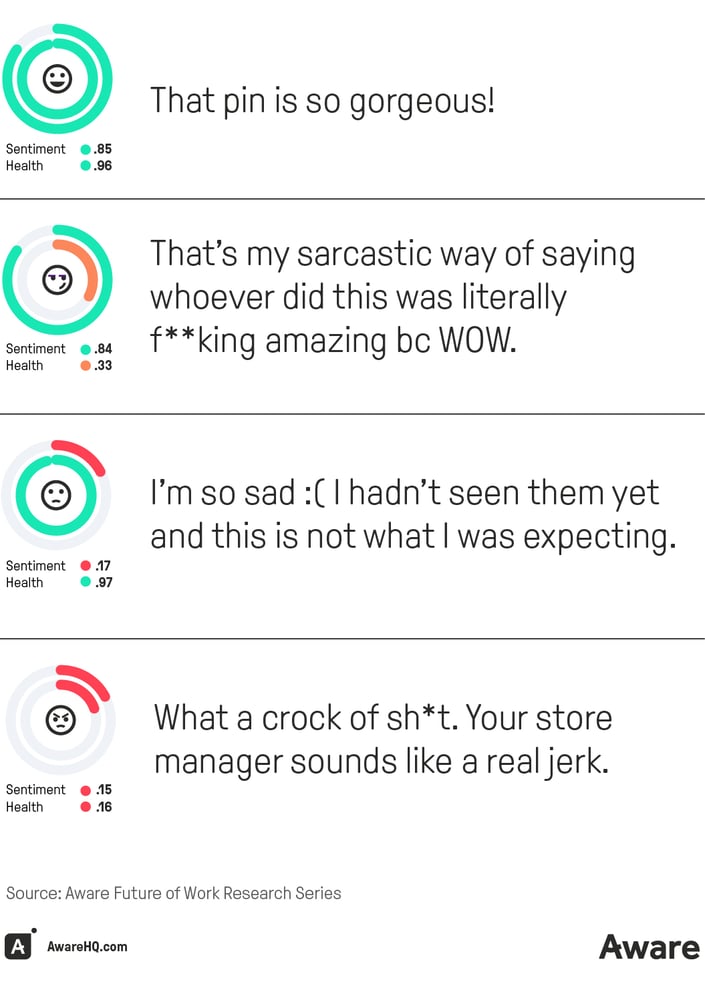
Most messages on Reddit (89%) were healthy. However, 11% of messages were toxic in nature. That is over five times the rate we would expect to see within traditional workplace collaboration tools and means more than one in ten messages in these communities are poisoning the atmosphere and making good-faith communication harder.
While it’s reasonable to anticipate that anonymous social forums would have a higher degree of toxicity than tools overseen by employers, it also suggests that the true level of toxic behavior is higher than that surfaced through internal channels alone. It’s essential that employers find ways to identify and address toxicity, as in corporate settings it is associated with reduced morale, performance decline, high turnover, and worsening brand reputation.
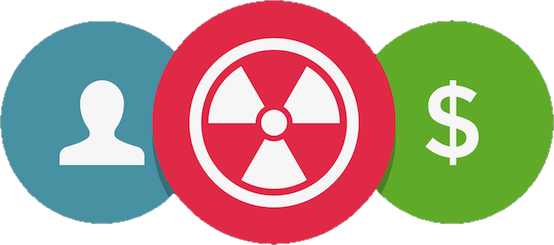
What could a toxic employee cost your organization?
Interestingly, message volume had an inverse relationship with toxicity in almost all cases—generally speaking, days with fewer messages scored lower for overall conversation health.
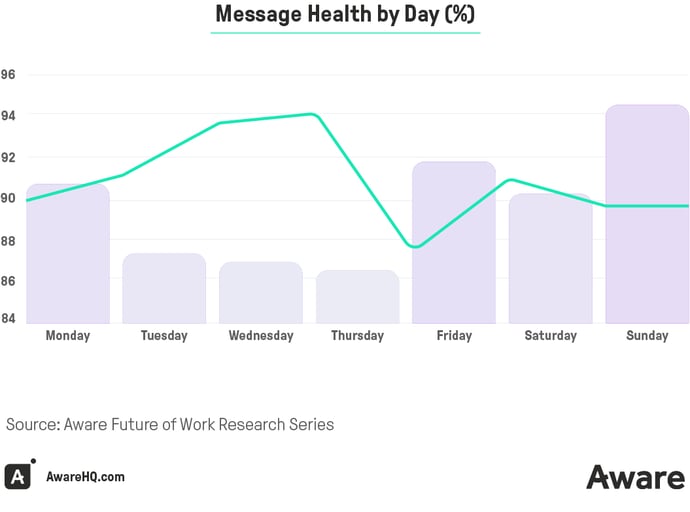
This demonstrates a phenomenon first observed by Aware data scientists in the Human Behavior Risk Analysis, namely the disproportionate impact of negativity and toxicity.
The majority of collaboration messages are neutral in sentiment. However, at the ends of the scale, there is an imbalance between the scores of the most toxic message vs. most healthy. This lowers the overall score of the collaboration environment. On days when there are fewer total messages to counteract this effect, the results are seen more clearly.

Read the Human Behavior Risk Analysis Report
The topics that impact sentiment the most
To understand the topics and themes that are common across frontline workplaces, we categorized messages into six core categories. Ranked from healthy to toxic, they were:
- Work-Life Balance – 87.54% healthy (+2.98% over median)
- HR – 86.40% (+1.84%)
- Money – 85.15% (+0.59%)
- Day-to-Day Issues 83.66% (-0.90%)
- Culture/Coworkers - 82.63% (-1.93%)
- Personal – 81.99% (-2.57%)
Digging deeper into the topics driving negativity within the subreddits, we discovered some interesting trends. Unsurprisingly, healthy messages were dominated by subjects such as PTO (92.46% healthy), while terms such as "grind," "abuse," and "harassment" appeared more commonly in toxic content. However, when looking at culture/coworker keywords, Aware data scientists were surprised to discover that "coworker" ranked more consistently toxic than "supervisor," "boss," or "CEO."
- Associate – 85.48% healthy (+4.88% over median)
- Manager – 84.21% (+3.61%)
- Supervisor – 83.67% (+3.07%)
- CEO – 80.09% (-0.51%)
- Boss – 75.42% (-5.08%)
- Coworker – 74.76% (-5.84%)
This suggests that employees are more preoccupied by day-to-day conflicts with the people they work alongside than with the company as a whole. In fact, the subject of daily conflict arose again and again in keywords common to all subreddits:
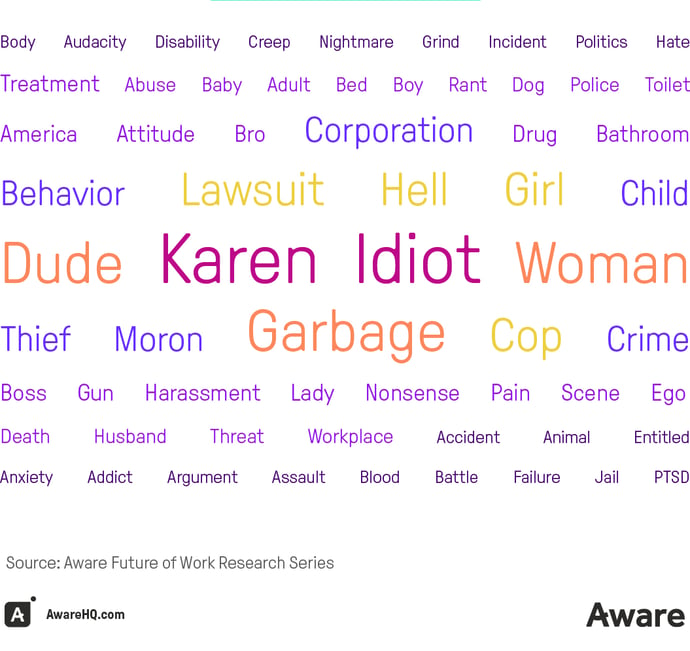
Frontline workers are in a constant state of conflict, and it is having a detrimental impact on their mental health. In a post-pandemic, highly polarized society, it’s often those in public-facing positions who bear the brunt of frayed tempers and short fuses. One study of restaurant workers, for example, found that 72% reported that customers are more demanding than before the pandemic, but today they tip less.
Hans Steiner, emeritus professor of psychiatry at Stanford University, says: “People feel almost entitled to be rude to people who are not in a position of power.” Meanwhile the antiwork movement has exploded in popularity as workers coalesce behind demands for better conditions and pay. The subreddit r/antiwork alone has 2.6 million members.
Today’s frontline employees are caught in an unprecedented battle between their corporate employers and the customers they come face-to-face with every day. Daily operational issues, global supply chain disruptions, and hot-button political topics all fall to frontline workers to navigate, often with little or no guidance. It’s no wonder the retail sector turnover rate hasn’t dipped below 60% in years.
Retailers might consider high churn to be a cost of doing business, but when they lose experienced employees, they also lose valuable institutional knowledge that can only be gained from being on the front lines. As the people who interact with products, services, and customers every day, frontline employees develop a unique understanding of the business. Their intuitive insights can answer in moments the questions that executives ponder for months. Retaining that talent and tapping into those insights is the primary challenge of today’s business leaders, who are often dismissed as out-of-touch by the workforces they head.
When managers lack insight into the daily challenges faced by those on the front line, they can’t make the changes necessary to improve employee experience. What’s needed are new ways for employees to feel safe and heard. While the investments of the digital transformation focused on customer experience, frontline collaboration tools are packed with insights from the very people whose job is to provide that experience. Using Aware, executives can now listen authentically to employee voices at scale, both accessing the innovations of the front line, and understanding the daily challenges frontline workers face in dealing with difficult customers.
The long shadow cast by Karens
Anecdotally, it isn’t hard to find examples of customers behaving badly. From viral videos of customers attacking employees, to firsthand testimony that suggests some customers don’t even see frontline staff as people:
When mask mandates became a thing for customers, I was working in a very slow mall location after a several-month-long government-mandated shut down. A woman came in and I asked her if she had a mask, and her response was "Yes but why do I have to wear it, there's nobody in here." —Reddit
A recent survey of frontline workers revealed that almost 70% deal with frustrated or angry customers at least several times a month. In fact, combative customers are such a mainstay of frontline life, today there’s even a nickname for them. Karen.
Every subreddit the Aware data scientists studied had the topic of Karens in common.
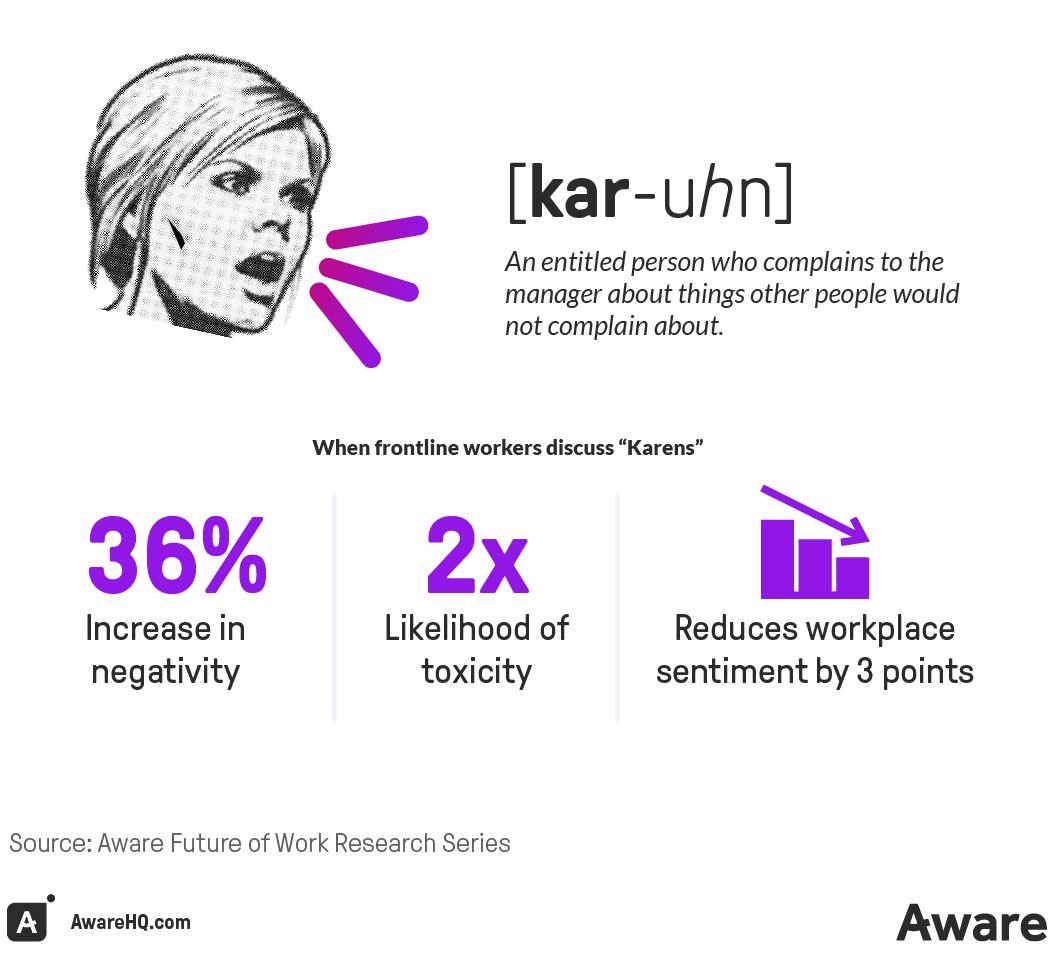
When frontline workers discuss “Karens:”
- Negativity increases by 36%
- The likelihood of toxicity almost doubles
- Overall workplace sentiment drops by 3 points
A Karen is defined as a customer who escalates complaints beyond what is considered reasonable or normal. This makes them particularly challenging for frontline employees. However, it isn’t the Karens themselves who leave frontline employees feeling demoralized. It’s the failure of managers and the corporation to support frontline workers that is driving resentment and burnout.
I understand prioritizing the guest, but it feels like corporate (and in some cases management) enables the behavior of Karens and people who get a power trip from harassing us and making our jobs miserable. — Reddit
Compared with the average sentiment of all messages across the workplace subreddits, the theme of “Karens” was noticeably less healthy and more toxic. Despite only accounting for 0.1% of all messages studied, this single topic reduced overall sentiment by 3%—an impact 30 times greater than volume alone would suggest.
|
What % of messages are… |
Overall Results |
Karen Topic |
Difference |
|
Positive |
8 |
2 |
-6% |
|
Neutral |
86 |
79 |
-7% |
|
Negative |
8 |
11 |
+3% |
|
Healthy |
89 |
80 |
-9% |
|
Toxic |
11 |
20 |
+9% |
Frontline workers are an organization’s public face, but when things go wrong, they’re also the least equipped to resolve customer complaints. These employees typically lack the authority to override policies and procedures to make an exception, and often have no choice but to deliver news that customers don’t want to hear.
That creates combative situations within the workplace that are only exacerbated when a customer escalates a complaint to a manager who can and does bend the rules in their favor. “If the customer is always right, that implies the employee is always wrong,” notes Aware co-founder and CEO Jeff Schumann. “Frontline workers have borne the brunt of this mindset for too long. But these critical workers are the public face of the business. They have unique knowledge of the company, products, and market that can transform the relationship between the brand and its customers, if only executives could tap into those insights. Aware is the solution. Our technology is a direct line between the breakroom and the boardroom, giving every employee a voice and ensuring they are heard at the highest level.”
Three years on from the COVID-19 pandemic, and two from the Great Resignation, the retail sector is still experiencing involuntary turnover rates almost twice as high as the average for other industries. Half of new frontline hires will quit within the first 120 days, and those that remain turn to coworker forums like Reddit or Workplace from Meta to find the support and empathy their leaders fail to provide.
The pattern is clear. When employees have negative interactions with unreasonable customers, they want their employers on their side. Whether through inexperience (up to 40% of frontline managers are in their first year at that position) or falling back on standard policy to appease individuals who are clearly taking advantage, appeasing difficult customers leaves employees feeling betrayed. This starts a negative feedback loop where they begin to question their position at the company. “I’m not paid enough for this,” is a common refrain.
How leaders can solve problems for the front line
Training managers and frontline workers on how to respond to customer complaints is the first step in solving this disconnect, but it cannot be the only solution. By necessity, managers have discretion to bend the rules to resolve difficult situations. But the workers on the front lines have the insights that can prevent those situations from ever arising.
Nobody knows your customers like the people who interact with them every day, and their collaboration conversations are filled with insights into products, services, and operations that can transform the ways your business runs. Aware’s AI data platform can extract those insights and give them directly to the decision makers who need them most.
Some of the ways Aware customers use employee listening insights include:
- Proactively addressing toxicity and protecting their company culture
- Understanding how employees react to new initiatives and top-down messaging
- Enhancing existing workflows with real-time reports of outages, delays, and disruption
- Providing better benefits and perks by listening to what employees really want
- Adjusting products, policies, and procedures in response to authentic feedback
About Aware’s AI and NLP
Aware is an AI data platform for employee listening that was custom-built to deliver authentic insights into collaboration voices at scale. Using proprietary natural language processing (NLP) and sentiment scoring, Aware can analyze employee voices at scale and deliver insights from across the enterprise. Our best-in-class technology provides near-human accuracy and consistently outperforms all competitors for sentiment scoring, including Microsoft and Google.
Early on, Aware’s data scientists realized that generic datasets only produce generic results. To get real intelligence, you need clean data. The natural language processing (NLP) models developed by Aware are trained on millions of real workplace collaboration messages. These messages differ from traditional written communication in several ways—they’re short, informal, and filled with slang, acronyms, and emojis. Some managers today are making critical business decisions with little more than a 👍.
The purpose of these results isn’t to discover if Joe Smith dislikes his manager, but to uncover the insights trapped within the collective intelligence of the company as a whole. Previous Aware studies have shown that employee insights can match Vegas bookmakers for accuracy, making them a rich source of data that can inform decisions made at the highest levels.
Why Reddit
Employee feedback is critical for any organization seeking to better understand their business. Traditionally, leaders sought that feedback through annual and pulse surveys and internal reporting mechanisms such as one-to-one sessions and anonymous suggestion boxes. These solutions provide some insight into workplace sentiment, but they are also increasingly problematic in today’s always-on world.
Aware’s innovative AI analysis of real-time conversations is disrupting employee engagement surveys by providing faster feedback from a broader section of the workforce, without the inherent bias that exists in choosing what questions to ask. This enables leaders to take the pulse of their organization and understand fluctuations in sentiment as they happen.
For even more insightful feedback, employers should look beyond what their people say at work. Countless online communities provide new ways for coworkers to discuss their organizations anonymously, shedding new light on systemic problems and common sentiment for the leaders willing to listen. This includes dedicated workplace discussion forums like Fishbowl and Blind, and social networks like Facebook and Reddit.
Thanks to Aware’s Context API, business leaders can augment internal listening strategies with the aggregate insights from these third-party communities. This is especially useful in low-trust environments where employees may not speak freely during surveys or within internal collaboration tools. Even in workplaces that embrace feedback of all kinds, there are insights to be gleaned from understanding the topics that continue to upset or engage employees outside of work.
Final thoughts
Frontline workers are an organization’s public face, and they know its customers and products best. But the insights these critical workers hold rarely filter up through business silos to the people making decisions. Aware provides the missing connection between the breakroom and the boardroom, visualizing in real time the insights that matter most to frontline workers today. Using these insights, executives can make faster, better decisions, with confidence that their actions will improve the way the business operates.
